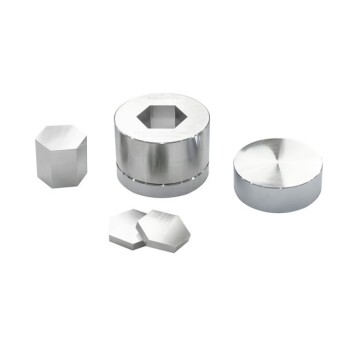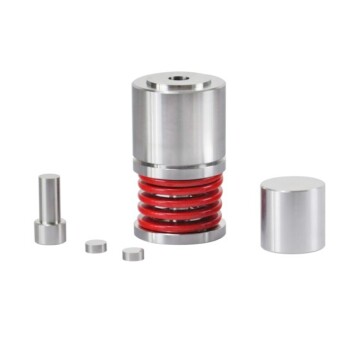In a modern laboratory, a hydraulic press serves three primary functions: preparing samples for analysis, testing the physical properties of materials, and forming or prototyping small-scale components. It is valued not for brute strength alone, but for its ability to apply immense, quantifiable, and repeatable force in a highly controlled manner, which is fundamental to scientific and engineering research.
The core value of a laboratory hydraulic press is its ability to translate raw materials into measurable data. It achieves this by applying precisely controlled force, enabling everything from spectroscopic analysis to material strength characterization.

The Core Functions in Detail
A hydraulic press is a surprisingly versatile tool. While its principle is simple—using fluid pressure to generate force—its applications are critical across various scientific disciplines.
Sample Preparation for Analysis
Many analytical techniques require samples to be in a specific, consistent form. The press is the ideal tool for this physical transformation.
It is most famously used to create KBr (potassium bromide) pellets for FTIR spectroscopy. The sample is mixed with KBr powder and pressed into a thin, transparent disc, allowing infrared light to pass through for analysis.
The press is also used for XRF (X-ray fluorescence) analysis, where powdered samples are compacted into dense, flat pellets to ensure a uniform surface for accurate elemental measurement.
Material Strength and Durability Testing
This is a cornerstone of materials science and engineering. A press allows researchers to quantify how a material behaves under compressive stress.
By applying a known, increasing force and measuring the material's deformation or failure point, scientists can determine properties like compressive strength and elastic modulus.
This is essential for developing and validating new alloys, polymers, ceramics, and composites, ensuring they meet the demands of their intended application.
Prototyping and Small-Scale Forming
In research and development, a press can be used to form novel materials or create prototypes of small devices.
This includes applications like compacting specialized powders to create unique composite materials or shaping polymers for prototyping microfluidic devices.
In pharmaceutical R&D, presses are used to study powder compaction, which is a critical step in forming tablets and understanding drug delivery mechanisms.
Why a Hydraulic Press? The Principle of Controlled Force
Other tools can crush or shape things, but the hydraulic press is dominant in labs for several key reasons that all revolve around control.
Unmatched Force with Precision
The fundamental advantage of hydraulics is force multiplication. A small effort on a pump can generate tons of force at the platen.
Critically, this force is not just immense; it is measurable and adjustable. Modern presses have gauges or digital readouts, allowing a user to apply a precise, documented amount of pressure every time.
Repeatability for Scientific Validity
Science depends on repeatable experiments. A hydraulic press ensures that every sample is prepared or tested under the exact same conditions.
This removes operator-dependent variables, ensuring that any differences observed in the results are due to the sample itself, not inconsistencies in the preparation method.
Inherent Safety and Efficiency
Hydraulic systems are generally safer than their mechanical screw-type counterparts. They have built-in pressure relief valves that prevent overloading, protecting both the user and the equipment.
They are also highly efficient, requiring minimal physical effort to generate substantial force, and typically have low maintenance requirements, making them a cost-effective tool over the long term.
Understanding the Key Considerations
Choosing the right press is not a one-size-fits-all decision. The selection must be driven by the specific scientific goal.
Matching Press to Purpose
The most important factor is the intended application. A press designed for creating small 13mm KBr pellets might have a maximum force of 15 tons and a small footprint.
In contrast, a press used for testing the compressive strength of concrete samples may be a large, floor-standing unit capable of exerting 100 tons of force or more. Mismatching the tool to the task can lead to poor results or damaged equipment.
Manual vs. Automated Operation
Manual presses are common in academic labs. They are operated with a hand pump, offering direct tactile control, and are perfect for preparing individual or small batches of samples.
Automated or programmable presses are used for higher throughput applications or when a precise pressure ramp or hold time is required. These are common in quality control and industrial R&D labs.
Making the Right Choice for Your Lab
Your primary research objective will dictate the type of press you need.
- If your primary focus is spectroscopic sample prep (FTIR, XRF): You need a small, manual benchtop press (12-15 tons) with a compatible pellet die set.
- If your primary focus is materials testing (polymers, composites, ceramics): You need a press with a higher force capacity (25 tons or more) and a clear, accurate pressure gauge or digital force display.
- If your primary focus is versatile R&D and prototyping: A 25-ton manual benchtop press offers a great balance of force, control, and footprint for a wide range of applications.
Ultimately, a laboratory hydraulic press is a precision instrument for converting physical matter into reliable, actionable scientific insight.
Summary Table:
| Function | Key Applications | Key Benefits |
|---|---|---|
| Sample Preparation | KBr pellets for FTIR, pellets for XRF | Consistent, uniform samples for accurate analysis |
| Material Testing | Compressive strength, elastic modulus | Quantifiable data on material properties |
| Prototyping and Forming | Composite materials, microfluidic devices | Controlled shaping for R&D and innovation |
Ready to elevate your laboratory's capabilities with a reliable hydraulic press? KINTEK specializes in lab press machines, including automatic lab presses, isostatic presses, and heated lab presses, designed to meet your needs for precise sample preparation, material testing, and prototyping. Our equipment ensures repeatable results, enhanced safety, and efficiency for laboratories in research, materials science, and pharmaceuticals. Contact us today to discuss how we can support your scientific goals and provide tailored solutions!
Visual Guide

Related Products
- Laboratory Hydraulic Press 2T Lab Pellet Press for KBR FTIR
- Laboratory Hydraulic Press Lab Pellet Press Button Battery Press
- Manual Heated Hydraulic Lab Press with Integrated Hot Plates Hydraulic Press Machine
- Automatic Laboratory Hydraulic Press Lab Pellet Press Machine
- Manual Laboratory Hydraulic Press Lab Pellet Press
People Also Ask
- How are hydraulic presses used in spectroscopy and compositional determination? Enhance Accuracy in FTIR and XRF Analysis
- What are some laboratory applications of hydraulic presses? Boost Precision in Sample Prep and Testing
- How do hydraulic press machines ensure precision and consistency in pressure application? Achieve Reliable Force Control for Your Lab
- What is the role of a hydraulic press in KBr pellet preparation for FTIR? Achieve High-Resolution Chemical Insights
- What role does a high-pressure laboratory hydraulic press play in KBr pellet preparation? Optimize FTIR Accuracy



















